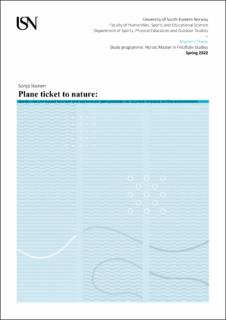Plane ticket to nature: Nordic nature-based tourism entrepreneurs’ perspectives on tourism impacts on the environment
Master thesis
Permanent lenke
https://hdl.handle.net/11250/3009031Utgivelsesdato
2022Metadata
Vis full innførselSamlinger
Sammendrag
Nature-based tourism (NBT) in the Nordic countries is a growing field of tourism, dependent on both nature and arriving tourists. Other unique features of Nordic NBT are the right to roam in nature, the tradition of friluftsliv, micro and small NBT companies led by lifestyle entrepreneurship, and the emphasis on seasonal variation. My study took place in 2022, two years after the covid-19 pandemic, which set the world into a global lockdown. The inquiries for more sustainable tourism practices were already a crucial topic before the pandemic, but the lockdown time also challenged the tourism industry to review its premises. This critique considers the paradoxes when sustainable tourism policies still primarily focus on growth and leave, for instance, the industry's high carbon footprint out of the development plans. The paradox raised my interest in investigating how Nordic NBT entrepreneurs perceive the tourism impacts on the environment. The paper built on a qualitative case study and investigated three entrepreneurs, two from Finland and one from Norway, who run their businesses in a unique pro-environmental strategy. All entrepreneurs were highly aware of the environmental causes of NBT and described a dissonance between environmental attitudes and actions. The existing gap was explained in beliefs re-establishing the consonance and altered pro-environmental behavior and local actions. The study results, insights into the conflicting values and practices created new knowledge and understanding about the Nordic NBT and human-nature relationship, how the industry entrepreneurs perceive the environmental issues, and balance between the environmental matters and profitable business management. The study findings describe the complexity of sustainable tourism and reveal unique local, sustainable tourism practices. The study creates a new opening to the discussion of the human-nature relationship in the context of NBT and a starting point for further critical investigations of sustainable tourism.
Keywords: Nature-based tourism, Environmentally sustainable tourism, Cognitive dissonance theory, Case study
